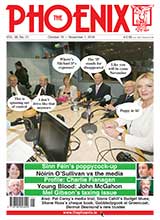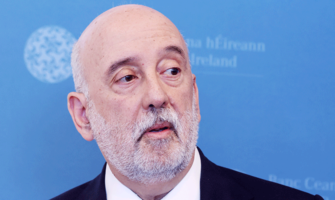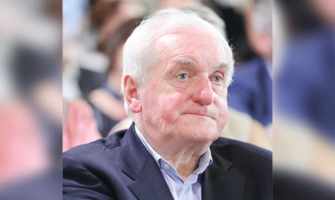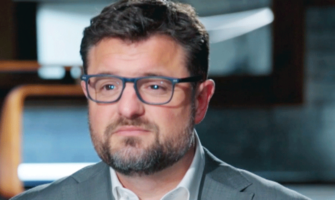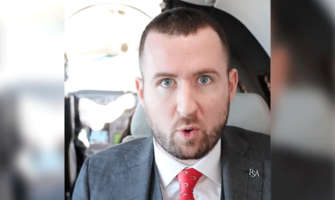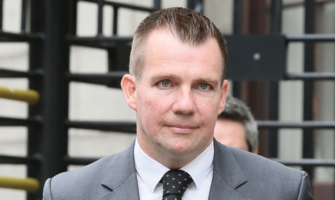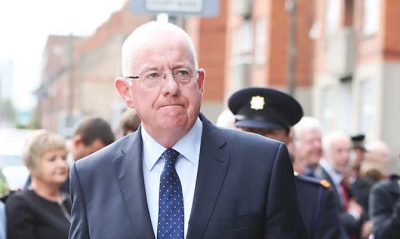
Charlie Flanagan
JUSTICE MINISTER Charlie Flanagan will not have been discommoded by the latest Charleton Tribunal report. The report damns ex-Commissioner Martin Callinan and his sidekick, David Taylor, but it puts distance between the old Garda regime and the present. Despite the recent history of Garda tumult, it appears that a sense of calm has descended on the force, helped also by the latest proposals, however dubious, for Garda reform. And Charlie will not refuse the credit for this state of affairs.
Nobody has had to battle harder to reach cabinet level than Flanagan. Bad choices in a series of leadership battles held him back over the years. And bad judgment with various public outbursts has presented an image of turbulence. How he managed to surmount such obstacles and become a cabinet member in 2014 is a story in itself.
A long standing joke in FG is that whoever Flanagan supports in a leadership contest is destined to lose. A young Charlie was a staunch supporter of Alan Dukes when he succeeded Sir Garret FitzGerald in 1987 and, while the inept Dukes was completely isolated when he eventually resigned in 1990, Flanagan had been one of the last to abandon him.
When the next leader, John Bruton, also appeared to be floundering in 1994, Charlie signed a motion of no confidence in him along with Michael Noonan, Alan Shatter, Frances Fitzgerald, Jim Higgins, Jim O’Keeffe and Dukes. The attempted coup failed and was followed by Bruton’s rather fortunate ascent to taoiseach later that year.
This was to be the first, chastening political lesson for Charlie. Despite being party chief whip and front bench health spokesperson under Bruton – indicating future preferment as a junior minister at least – he received no such appointment in Bruton’s government in the mid-90s.
Fast forward to 2010 and Enda Kenny, with the aid of Field Marshall Phil Hogan, famously crushed another leadership revolt – with Charlie again caught offside. Even worse, he initially declared for Kenny before defecting to the rebels, under Richard Bruton, a few days later.
Kenny’s initial vengeance was lukewarm as he merely demoted Flanagan from spokesperson on justice to that of children. But a colder dish was served when Kenny came to power nine months later, with Flanagan left out of the cabinet and even the list of junior ministers – again.
Rehabilitation came in 2014, when cabinet resignations saw Flanagan firstly parachuted into cabinet as children’s minister and two months later promoted to foreign minister. Most analysts pointed to the drain of Kenny’s allies from cabinet that had to be replaced with new allies, like Flanagan, in this period.
But as Goldhawk pointed out, Flanagan had made a series of barbed comments between 2011 and 2013 about the relationship between Denis O’Brien and Fine Gael. These culminated with the pointed remark, “Funny no concern expressed at track record of companies awarded contracts for water meter installation” – a less than subtle dig at O’Brien’s Siteserv owned company, Sierra, securing four of the eight regional contracts for the metering programme (see The Phoenix, 23/8/13).
Flanagan’s strategy concentrated Kenny’s mind and, fearful of the dissent that Flanagan could foment in FG’s parliamentary party – of which Flanagan was chairman from 2011 – the taoiseach decided to bring him into the tent in May 2014.
It should also be acknowledged that Flanagan is a substantial politician and had been obvious ministerial material for some years, especially when one considers some of the loyal dullards that staffed the cabinet in those periods.
Yet again Flanagan was faced with a party leadership dilemma in 2017, when Leo Varadkar faced off against Simon Coveney. This situation appeared more life threatening than previously, given the arrival of Charlie’s 60th birthday and the unlikelihood of political resurrection should he again pick the wrong side. The trouble was, his ‘side’ appeared to have been picked for him as it was felt that senior cabinet members would have to support Coveney to retain their status. Varadkar moved quickly to assure Frances Fitzgerald, Heather Humphreys and Charlie that he would keep them in cabinet if they voted for him – an offer they could not refuse. Thus Flanagan remained as foreign minister on Vlad’s ascent to power in June 2017, before replacing Fitzgerald as justice minister.
EMBARRASSING LEGACY
Flanagan is a complex politician who likes it to be known that he is a liberal in the Garret FitzGerald mould. But it is his determination to shed the embarrassing legacy of his father, the outspoken Oliver J Flanagan, who made General Eoin O’Duffy look like a wet liberal, that colours his political self-image.
Oliver J made some outrageous remarks about Hitler and the Jews in 1943 and Charlie has made a point of identifying with Israel, attending a meeting of the Oireachtas Friends of Israel some years back (as did Varadkar). What Charlie may or may not realise is that, in the 1930s and 1940s, anti-Semitism was the preserve of the hard right, whereas today support for Israel is a touchstone for the new right.
The sophisticates in Iveagh House had to educate Flanagan when he became foreign minister. In 2014 in one of his first speeches in that role, to the UN, Flanagan opened up with a demand that the UN “eradicate terrorism” and blamed Russia – not US and EU agitation – for the Ukrainian crisis. He effectively criticised the Palestinians for provoking the Israeli slaughter in Gaza and condemned “the persecution of Christians and other minorities in the Middle East”.
Subsequently, his emphasis switched to Irish foreign policy as guided by human rights and by ”values … justice … disarmament” as opposed to “commercial or political interests” in more liberal, modernist western language. At the same time, Irish foreign policy remained and still remains wedded to the EU goal of a common foreign and security policy involving militarisation of the EU.
Northern policy under Flanagan and Kenny will go down as perhaps the biggest Anglo-Irish failure of any southern government. They stood by while the DUP, backed by the then British PM David Cameron, refused to honour the Good Friday Agreement as it applied to parity of esteem for northern Catholics. Following the collapse of the Assembly and the record vote of Sinn Féin in 2017, and with Theresa May installed as British PM, the Dublin government’s lame attempts to assert themselves were swatted aside.
When Kenny dared to suggest that he and May had agreed there could be no return to direct rule, the Northern Ireland Office declared, “The stability of institutions in Northern Ireland is the responsibility of the UK government”. This was the most humiliating slap down of an Irish government in over three decades and only a ritualistic (and futile) effort to convene all-party talks saved some face for Kenny and Flanagan.
Much of Flanagan’s northern failure was really down to Kenny and the FG party that regarded the danger of SF’s growth in the south as more threatening than the collapse of the northern institutions.
But Flanagan also had to contend with Kenny’s ham-fisted efforts in 2016 to convene an all-island Brexit forum. Kenny’s failure to consult with DUP leader Arlene Foster produced the inevitable ‘Niet’ from Arlene. Publicly, Flanagan kept his counsel, but “well-placed sources” let the media know that neither the minister nor Iveagh House officials knew anything about the abortive and bungled plan.
The contrast between the Kenny/Flanagan duo and the more recent Varadkar/Coveney axis is marked. Even SF is impressed with the latter and it has led to speculation that a FG/SF coalition is an option after the next election.
Another perceived failure by Flanagan was the long-time jailing in Egypt of Ibrahim Halawa. While Coveney’s soft diplomacy was as ineffectual as Flanagan’s limp efforts to free Halawa from President al Sisi’s Egyptian jail, the Cork man got lucky when pressure from Europe saw Halawa released just four months after he replaced Flanagan as foreign minister. Halawa’s long incarceration and the frustration of his Dublin-based family had caused Flanagan serious embarrassment throughout his three-year term as foreign minister.
Flanagan was suddenly released from the diminished role of the foreign minister’s job – the taoiseach’s department had by then usurped its EU functions – when incoming taoiseach Varadkar made him justice minister in July 2017. The catalogue of Garda scandals and the political fall-out that saw the resignation of two justice minsters and two Garda commissioners, the Disclosures Tribunal and a welter of sensational media reports arising from various whistleblowers, has made justice the most sensitive cabinet portfolio by far.
Flanagan’s tendency to shoot his mouth off made his appointment a risky choice as exemplified by his use of the C… word when denouncing SF in 2015 – language that would have seen off a minister in most EU countries. His repeated remarks about FG and Denis O’Brien worked out well for him, as mentioned earlier, but could easily have backfired and indicated an appetite for confrontation hardly required in a justice minister in these scandalous times.
SWINGEING ATTACK
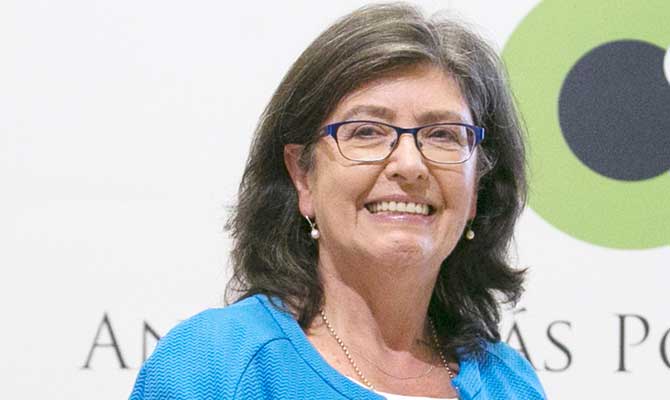
Josephine Fehilly
One of his first initiatives as justice minister was an attempt to mollify the judiciary and many in FG with a swingeing attack on Shane Ross’s Judicial Appointments Commission Bill – a bill that the justice minister was formally responsible for. In an Irish Times article, he attacked the basic premise of the bill and implied a comparison between Ross and subversive elements. He also stated he would not be subject to demands from fellow cabinet member, Independent Alliance minister Ross. Within 24 hours he issued a contrite, “clarifying” statement saying he was fully behind the bill. Varadkar’s office denied the taoiseach had instructed him to make the statement, something that underlined that very fact.
More recently, Flanagan reacted in Dr Strangelove fashion to alarming scenes of gardaí in masks protecting private security personnel, also masked, who were evicting campaigners against homelessness. Charlie proposed legislation to ban the photographing of gardaí, an attack on press freedom that sounded even more draconian and ill judged in the midst of the greatest homeless and housing crisis in the state’s history. It underlined how crass some of Flanagan’s public statements can be.
Nevertheless, Flanagan has presided over a becalming of the Garda scandals that have dominated politics in the last few years. This is partly down to public ennui with the ongoing scandals as well as the cathartic effect of Justice Charleton’s tribunal, where revelations punctured some of the more dramatic claims made by various parties.
But the most indicative sign of the new tranquility surrounding the gardaí came with the surprising proposals from the Commission on the Future of Policing. The commission proposes not only the abolition of the Garda Ombudsman (to be replaced by some undefined new entity), it also wants the Policing Authority, chaired by the formidable and outspoken critic Josephine Feehily, to be subsumed (eliminated) into a new Policing and Community Safety Oversight Commission.
What the Garda Ombudsman actually needs is more resources and perhaps greater powers; instead, it is to be neutered. And the only statutory body that unsettled the complacency of Garda management was Feehily’s Policing Authority, now to be neutered as well. Meanwhile, An Garda Síochána is to remain the only police force in the developed world that retains control of security and intelligence.
The resignation of former IT editor, policing expert and former Garda ombudsman Conor Brady from the commission a year ago was a warning sign. Brady has lambasted the reversion to the old ways inherent in the report and said the justice department and Garda HQ would continue to enjoy the cosy chain of command, with justice at the head. It has been this way since the Civil War and the foundation of the state – events that have framed Garda culture.
Just two members of the commission, law lecturer Dr Vicky Conway and management consultant Dr Eddie Molloy, had reservations about the proposals. The powerful presence of such as commission chairperson and ex-Seattle police chief Kathleen O’Toole, retired justice department secretary general Tim Dalton and senior police officials from Britain and Canada was more than enough to dominate the thinking of more community-orientated members. The emphasis on community policing has served to obscure the capitulation of the reform crusade to the justice department bunker and Garda management. And it is most unlikely that Flanagan, who trumpeted the appointment of new Garda chief Drew Harris – PSNI link man with MI5 – will subject the commission’s proposals to vigorous, critical scrutiny.
REFORM
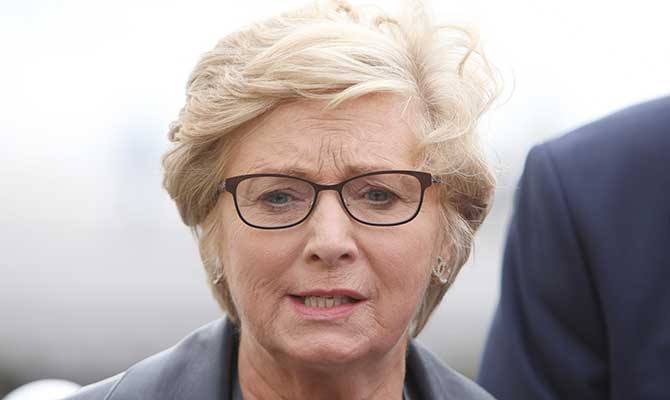
Frances Fitzgerald
Given the loud silence from media and political quarters, Flanagan and the government will claim to have reformed the Garda and Charlie will enjoy a lap of honour as this government draws to a close.
He will also bask in the comforting after glow of a referendum to abolish blasphemy, another safe, secular measure that shows how modern, liberal Ireland has grown up. The substitution of secular reforms – most of which are positive in themselves – for meaningful measures like the right to a home, a proper wage and decent health care, has become an art form fashioned by Labour and FG in recent years.
Charlie ought to enjoy this late life renaissance while he can. He is 62 next month and his political sell by date is approaching as the currency earned by switching from Coveney to Varadkar will have been well spent when, or if, Varadkar forms a new cabinet. There are far too many disappointed young Blueshirt supporters of Varadkar without cabinet or junior ministerial jobs who simply must be rewarded if FG returns to power.
Flanagan will easily retain his seat in the new five-seat constituency of Laois-Offaly, but he will not walk back into cabinet.



